SF in Ukraine: Ten Ukrainian SF/F Writers You Never Knew You Must Read

Terrified by a war that has no place in the 21st century, the interest in Ukrainian history and culture has risen, including science fiction and fantasy. Writer Volodymyr Arenev and literary critic Mykhailo Nazarenko recently published a general historical overview of Ukrainian SF/F (translated by Alex Shvartsman) in Clarkesworld 9/22. Even earlier, in January 2018, Locus magazine published a short review of Ukrainian Fantastic literature by Michael Burianyk.
However, when a SF/F fan tries to find Ukrainian science fiction or fantasy books translated into English, only a couple of names will appear – writers who wrote in Russian for a pan-Soviet audience. But since 1991, when Ukraine regained its independence, a whole new generation of SF/F writers has been born, all of whom write in Ukrainian, take an active part in the politics of their country, and wish nothing more than to declare to the whole world that we are here – a sovereign country with our own language, culture, history, and our own literature.
We hope that now, in a time when our country needs international help more than ever, our voices will be heard. We believe in the power of the fantastic to transform both personal and global experiences and provide familiarity for even the most unknown peoples. So let us show you ten young Ukrainian SF/F writers and their novels that are deserving of translation. They shed light on what the SF/F community in Ukraine is living through. The novels differ in genre and target audience, themes and ideas, but every single one of them is a story worthy of a greater audience and of being brought to the attentions of publishers and agents.
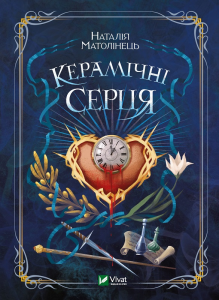 NATALIA MATOLINETS
NATALIA MATOLINETS
Natalia Matolinets is a young writer from L’viv who gained popularity after winning two literary contests in 2017. Her works have been on several short lists and have won several awards. Her Varta in the Game trilogy has been purchased for translation in Poland and Czech Republic. Her 2020 novel Ceramic Hearts is a standalone new adult historical fantasy that unfolds in the early modern era. Here, Kanre knows the rules of her life. She must not question and must obey the powerful maestros. Jarraque also knows his rules. He must become the Sun King`s perfect sorcerous weapon. Though they belong to different worlds, their destinies intertwine in a way that can break the eternal rules. Knots of intrigue tighten as the rules change and death hides everywhere, even in the filigree beauty of a ceramic heart. It remains only to decide: to fight or obey.
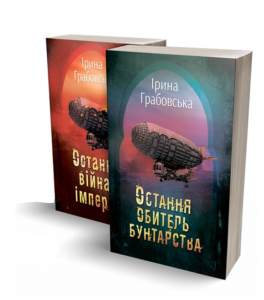 IRYNA HRABOVSKA
IRYNA HRABOVSKA
Iryna Hrabovska was born in the Donetsk region, invaded in 2014. She lived in Kyiv until the February invasion. Her Leoburg sequence is a steampunk duology set in an alternative Europe and consists of The Rebel’s Last Resort (2019) and The Last War of Empires (2020), the latter winning a place in the BBC 2019 Book Awards longlist. Her story is a look at how a peaceful city-state of scientists and artists can live on Ukrainian soil near hungry empires. The second book of the duology delves even more into real history, telling a story that parallels the 2014 Euromaidan revolution. In the first novel, Danylo finds himself in a parallel universe with airships, monorails and steamwork servants in the wonderous city of Leoburg. He’s mysteriously accepted as part of an aristocratic family who are doubles of his friends and relatives from his native world. He is forced to save a family member wrongly accused of murder. In the second volume, Danylo and friends struggle to save the city from murderous empires and find his own world, whatever that may be.
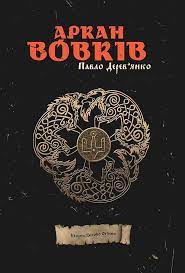 PAVLO DEREVIANKO
PAVLO DEREVIANKO
Pavlo Derevianko is a native of Kyiv. His Arkan of Wolves is the first volume of a dark fantasy trilogy that breathes new and relevant life into the legendary Ukrainian Cossack warriors. Based on Ukrainian mythology and Cossack legends, this novel tells a story about wolf knights – a counterintelligence and security brotherhood of werewolves called the Grey Order. They serve and protect the homeland, the historical Ukrainian Hetmanate, signing a blood pact in the Otherworld to gain shapeshifting superpowers at the expense of cursed burdens which cannot be purged. Set in 1845, the reader follows the young knight Severyn Chornovovk down the wolf path to see how much blood and tears are hidden under the shining armor of heroic legends.
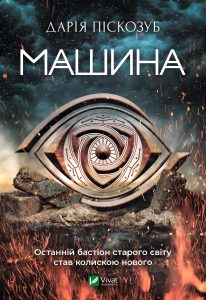 DARIA PISKOZUB
DARIA PISKOZUB
Daria Piskozub (author of this article) is a writer from L’viv and a winner of the Brama 2019 fantasy novel competition. She is also a host of SF/F events on the Vivat Publishing YouTube page and is a host of the “Fantastic talk(s),” a Ukrainian language YouTube channel along with other Ukrainian SF/F writers on this list – Natalia Matolinets, Iryna Hrabovska, Nataliya Dovhopol, and Svitlana Taratorina.
Daria’s novel Machina is the first book of a postapocalyptic technofantasy tetralogy about civilization having ceased to exist except for an artificial intelligence called Machina. Machina is the last remnant of the era of progress, now a deity worshipped by some of the remaining tribes. Machina’s rules are simple: conquer new territories every year and search for ancient knowledge. Twins Alexandra and Sebastian Toriati, blessed by Machina with the gift of weaving, bending the wills of all living creatures. Ethan Nakara is a young priest about to guide the army of his tribe, Catacla, in conquest for Machina. Each of them is waiting for their chance to earn Machina’s praise until it accuses Alexandra of treason. As the news reaches other tribes, the Holy War – the war that shall end only when the one that betrayed Machina is wiped from the face of the world – is declared on Catacla. To resist or obey, trust in Machina or search for one’s own path – Alex, Bastian, and Ethan must face the choice that will inevitably change the future of the world.
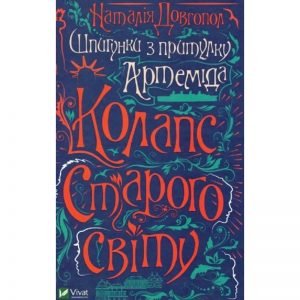 NATALIYA DOVHOPOL
NATALIYA DOVHOPOL
Nataliya Dovhopol is Ukrainian writer currently living in Athens, Greece. She works in multiple genres, such as adventure, retrofiction (a Ukrainian term for a genre that uses the atmosphere of some historical period but isn’t alternative history), and YA and historical biographical novels. Her books have been awarded several prizes and some have been recognized at the Odesa International Film Festival book pitch. In her Wandering Circus of the Silver Lady, a standalone mystical retrofiction, the glamorous owner of a wandering circus, Frau Gritte, faces hard times. Her husband’s schemes threaten bankruptcy for her enterprise. To make things worse, her best act – featuring an unnaturally huge wolf – is about to catastrophically unravel. A disturbed young girl goes on stage and tames the threatening beast. What is this if not witchcraft? As the circus continues its travels, its humans and werewolves search for love and justice and to find their real identity. They pass through the bitterness of betrayal and defeat, complete an adventurous journey through Ukrainian lands of the early 20th century, and find common language with mysterious creatures from the ancient legends.
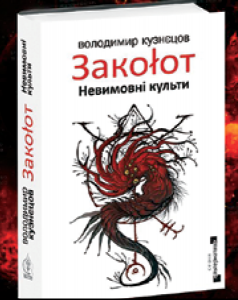 VOLODYMYR KUZNIETSOV
VOLODYMYR KUZNIETSOV
Volodymyr Kuznietsov is a Ukrainian SF/horror writer, game designer, comics writer, and metal musician from Lugansk region, the easternmost part of the country invaded by Russia in 2014. His hometown was taken by the Russian forces in late spring of that year and then freed by the Ukrainian forces in midsummer. This relatively short period – an intense clash of ideologies – left its trace in Kuznietsov’s 2020 book Mutiny. It is a complexly byzantine space opera fantasy, set in an alternate timeline where the Axis won WWII when Japan discovered advanced technological artifacts of an ancient, pre-human civilization. Occult practices, high tech, cosmic gods, official and forbidden cults are all mixed to create terrifying and often inhuman ideologies. This is all the backdrop for the story describing a mutiny on the eldest, giant mothership of the New Human Empire’s fleet. The book consists of six independent parts, some thousands of years apart, that can be read in any order. Depending on what order you choose, there is a different perspective on the main events, characters, major forces, and their motives. In the end, they are all pieces of the one greater puzzle for the reader to solve.
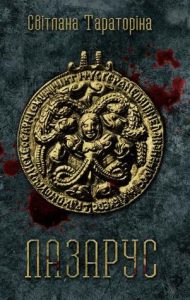 SVITLANA TARATORINA
SVITLANA TARATORINA
Svitlana Taratorina is from Crimea, the Ukrainian peninsula that was annexed by the Russians in 2014. She now lives in Kyiv and is also an author of comic books and children stories. Her Lazarus is a standalone speculative fiction book about an alternate Kyiv of the early 20th century. It was widely recognized, and received the LitAkcent Literary Award, and scored a place on the long list of the BBC Book Award 2019, along with the special award of the Ukrainian Book Institute at Bookforum Best Book-2019 and the Chrysalis Awards from the European Science Fiction Society. Lazarus takes place in Kyiv in 1913. People are comfortably living alongside the impure – ghouls, devils, and werewolves, as well as gruesome forest, field, and water spirits. For centuries a relative order between the two groups has been maintained: The humans rule the Empire, while the impure await the return of their legendary leader, the Dragon. But one day everything changes. In the reeds next to the Dnipro River’s Trukhaniv Island an adopted child of the water spirits is found with his stomach torn open. Doctors are adamant that the deceased is a human. In order to unravel the mystery and prevent a war between the humans and the impure, the authorities enlist the help of an experienced investigator Oleksandr Petrovych Tiuryn. Will he be able to defeat his own demons and actually see what he had for so many years refused to believe in?
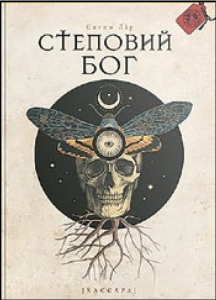 EUGENE LIR
EUGENE LIR
Eugene Lir is a writer, translator, and YouTuber from Melitopol, South Ukraine, and is known for the short story “sleepless in Enerhodar” (collected in the best of Eurasian horror anthology Eurasian Monsters, 2021); a speculative fiction collection, Still Waters Run Deep (Ukrainian Book of the Year nominee; English translation under license in progress); and a speculative fiction novel, Book of Imaginary Non-Creatures, co-written with Kshisia Fedorovych. Lir’s Steppe God (2019) is the first of the dark fantasy suspense trilogy Khassara and was nominated for a Book of the Year award. There is Great Nothing – and nothing more frightening than that. Ukrainian teenager Serhiy faces numerous fears hidden in plain sight amongst the steppes around Zapropady, a city in the South of Ukraine. A force older than existence itself awakens before his very eyes, and there’s no escape from Khassara.
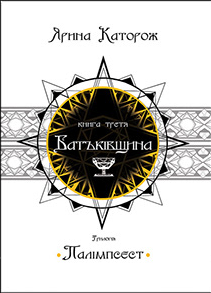 YARYNA KATOROZH
YARYNA KATOROZH
Yaryna Katorozh is a writer and illustrator from Vynnyky, Western Ukraine. Her 2015 fantasy novel Alchemy of Freedom received a special Ukrainian modern fantasy award at the Coronation of the word 2015 contest. Her novel Stozhar (2017), a nominee for the Bookforum Best Book in 2017, is the first of an epic fantasy trilogy about Patria – a country taken over by a northern empire. Patria was run by magic-wielders called Stozhars, near whom none dared to draw weapons but who were overcome by trickery. Patrians were enslaved and their language and culture forgotten. Eight dark centuries have passed, and a new Stozhar appears – Anna, from another world, who doesn’t remember herself and doesn’t know what to expect from her powers. She must decide whether to return to her safe home world or try to change the world she finds herself in. The world of Stozhar relies on Ukrainian culture and history, and its two sequels – Alliance (winning the Chrysalis Award from European Science Fiction Society in 2018) and Motherland – have already been published.
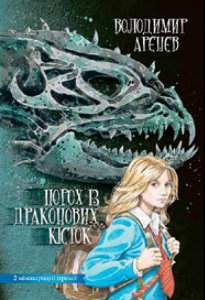 VOLODYMYR ARENEV
VOLODYMYR ARENEV
Volodymyr Arenev is the oldest and most experienced writer on this list. He is from Kyiv and is an award-winning science fiction and fantasy author as well as an editor and screenwriter. He has published more than 30 books and his short stories have been published in Ukrainian, Chinese, English, French, German, Lithuanian, Polish, Estonian, and other languages. His most popular works are for teenagers and have been awarded various literary awards, including Best Creator of Children’s Science Fiction or Fantasy Books (ESFS Awards; Dublin, Ireland 2014), Best Fantasy Novel for YA (2018) by BaraBooka, and BBC Book of the Year nomination in the Book for Children category (2019).
Arenev’s The Cinnabar Season is an urban fantasy/dystopian trilogy inspired by the hybrid war in Ukraine from 2014. Dragonbone Powder (2015) and Houndhead’s Child (2018) have been published, and the third, Dragon Orphans, is scheduled for release in 2023 or early 2024.
Martha Baumgertner is an ordinary high school student living in the provincial, dead-end, frontier town of Lower Ortynsk. She needs money to leave and study at University. Martha hates her stepmother and has no desire to ask her for any help. But, identified as a Witch at school, she has the ability to spellbind and neutralize the toxic bones of the long-dead dragon overlords. By law, any found bones must be handed over to the “jaeger” police, but there is money to be made by selling them on the black market. Her illicit activities lead her to uncover secrets about her father who’d gone off to war, a war resulting in the resurrected dead returning.
You can find out more information about the life of Ukrainian SF/F community on the Fantastic Talk(s) YouTube channel. Since the start of the invasion, the channel has gathered more than 100,000 hryvnias for the cause by conducting livestream interviews with renowned SF/F authors like Peter Watts, James S.A. Corey, Joe Abercrombie, and others.
My thanks to Michael Burianyk for his considerable help in editing this article.
Every writer mentioned in this article is dreaming about translation into English. For sample chapters, publishing rights info, or any general request, please contact Daria Piskozub. Slava Ukraini!
-Daria Piskozub
This report and more like it in the November 2022 issue of Locus.
 While you are here, please take a moment to support Locus with a one-time or recurring donation. We rely on reader donations to keep the magazine and site going, and would like to keep the site paywall free, but WE NEED YOUR FINANCIAL SUPPORT to continue quality coverage of the science fiction and fantasy field.
While you are here, please take a moment to support Locus with a one-time or recurring donation. We rely on reader donations to keep the magazine and site going, and would like to keep the site paywall free, but WE NEED YOUR FINANCIAL SUPPORT to continue quality coverage of the science fiction and fantasy field.
©Locus Magazine. Copyrighted material may not be republished without permission of LSFF.


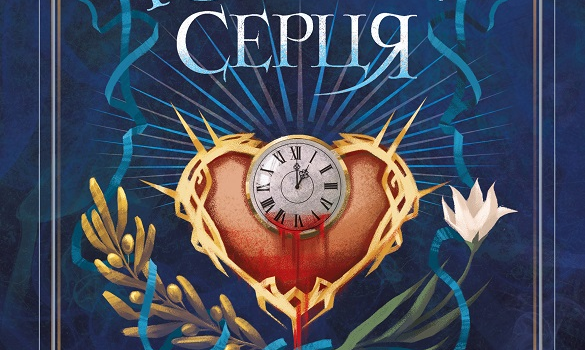




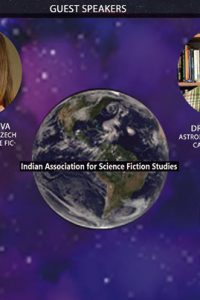

These all sound so cool! Thank you for writing this article – I’m adding so many of these books to my To Read list. I’ll be waiting and hoping that there will be English translations, but in the meantime maybe I’ll try out my limited language skills on the originals. Slava Ukraini!